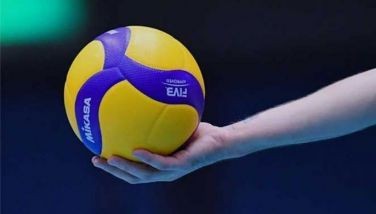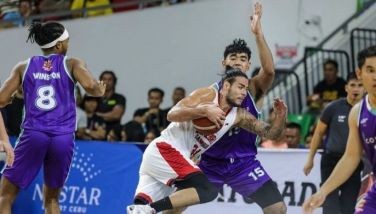Sick of getting shafted
The controversial loss of Filipino welterweight Wilfredo Lopez in his gold medal match at the 27th Southeast Asian Games in Myanmar only got two lines in some news entities’ reportage. But to be perfectly blunt, Lopez was cheated out of a gold medal in favor of his opponent, Wai Lin Aung, the only boxer from the host country to make it to the finals. After the previous instances of Filipino athletes having gold medals taken away from them, this writer is shocked that the Lopez decision went largely unnoticed.
Lopez was leading all the way against the plodding Aung, showing more speed, savvy and technical skill against the home favorite. Lopez had tremendous footwork that kept him out of trouble, and was actually kicking up the tempo in the second round to underscore his superiority. He was using the ring well and was never really threatened. He was well on his way to winning our third gold medal in six finals bouts.
Towards the last few seconds of the round, Ang connected with a left hook that landed on the outside corner of Lopez’s right eye socket, opening up a small cut. With under 10 seconds left in the round, the referee stopped the time, and had the ring physician look at the eye. Seconds later, they sent a confused Lopez to his corner, stopped the fight, and declared Aung the winner. Lopez thought he had won the fight and only realized what had happened when the result was announced a second time and Aung’s hand was raised in victory.
Let’s look at the facts. There was no need to stop the fight in the first place. There were only about five seconds left in the bout, and Lopez was moving freely around the ring with no sign of any harm. The cut was small, and the blood was trickling around the outside of his eye, not even impairing his vision. He was still fresh and unhurt. His cornermen could have easily remedied the cut in between rounds. Also, it took the doctor very little time to abbreviate the fight. Normally, doctors allow the fight to continue and observe if the cut opens up or bleeds too much.
Lopez had fought the better fight, was dictating the situation, and was never threatened. He had taken very few solid shots from Aung, and was never stunned or hurt. Worse, if the third round had been allowed to start, he probably would have walked away with that round, as well. But consider this one glaring fact: it was the last chance for the Burmese to win a gold medal, having been all but shut out of the boxing competition by Thailand and the Philippines. It called to mind the controversial loss of Onyok Velasco in the Atlanta Olympics of 1996, when his punches were being scored for his opponent, Bulgarian Daniel Petrov Bojilov. The leadership of the organizing group for boxing then was led by a countryman of Bojilov.
Looking at this development, this writer is tired of seeing Filipino athletes pour out their lives in preparing for these once in a lifetime moments, only to have them stolen to accommodate an inferior program from the host country. Aren’t we all tired of seeing our best and brightest getting shafted? This has been going on for decades, and is an accepted evil of the SEA Games onwards. But why do we accept it?
In past SEA Games, we have seen or heard reports of every dirty trick in the book to help pad the host country’s medal tally. Organizers give the stronger countries the worst practice times, turn off air-conditioning and lights, and then use biased referees as insurance. In extreme situations, hosts have allegedly even asked sure gold medal winning countries of “giving†them a gold medal or two. It makes a farce of the entire proceedings. And if I were a national athlete, I would wonder why I even went in the first place.
I’m not calling for a boycott, although our history of civil disobedience outstrips any other country’s. What I am saying is that we should seize this opportunity, instead of suffering from selective memory loss every two years. Let us take the lead in using this occasion to put our foot down and demand a change in the system. In 1980, the US boycotted the Olympic Games in protest over communism. Apartheid-era South Africa was banned from Olympic participation, as well. What do we stand for when we send our athletes to compete in hostile, uneven situations?
The Philippines should ask all SEA Games member countries to set terms and conditions to protect visiting countries to the SEA Games. This has been going on for far too long, and has had a negative effect on the Games. Beyond basketball (which we were also cheated in at the 1989 SEA Games), how many sports can we win even if the officials were against us? Why continue it this way?
The Philippines has a golden chance to reform the SEA Games and restore its lustre. It is painful to see that there is not even a full coverage of the biennial games, save for a few events covered by ABS-CBN Sports. The games deserve a good reputation and comprehensive coverage. We can bring all the region’s countries together to strengthen the event’s credibility and prestige by having everyone abide by the laws of sportsmanship and fair play.
It is the right thing to do, for the sake of the athletes.
- Latest
- Trending































